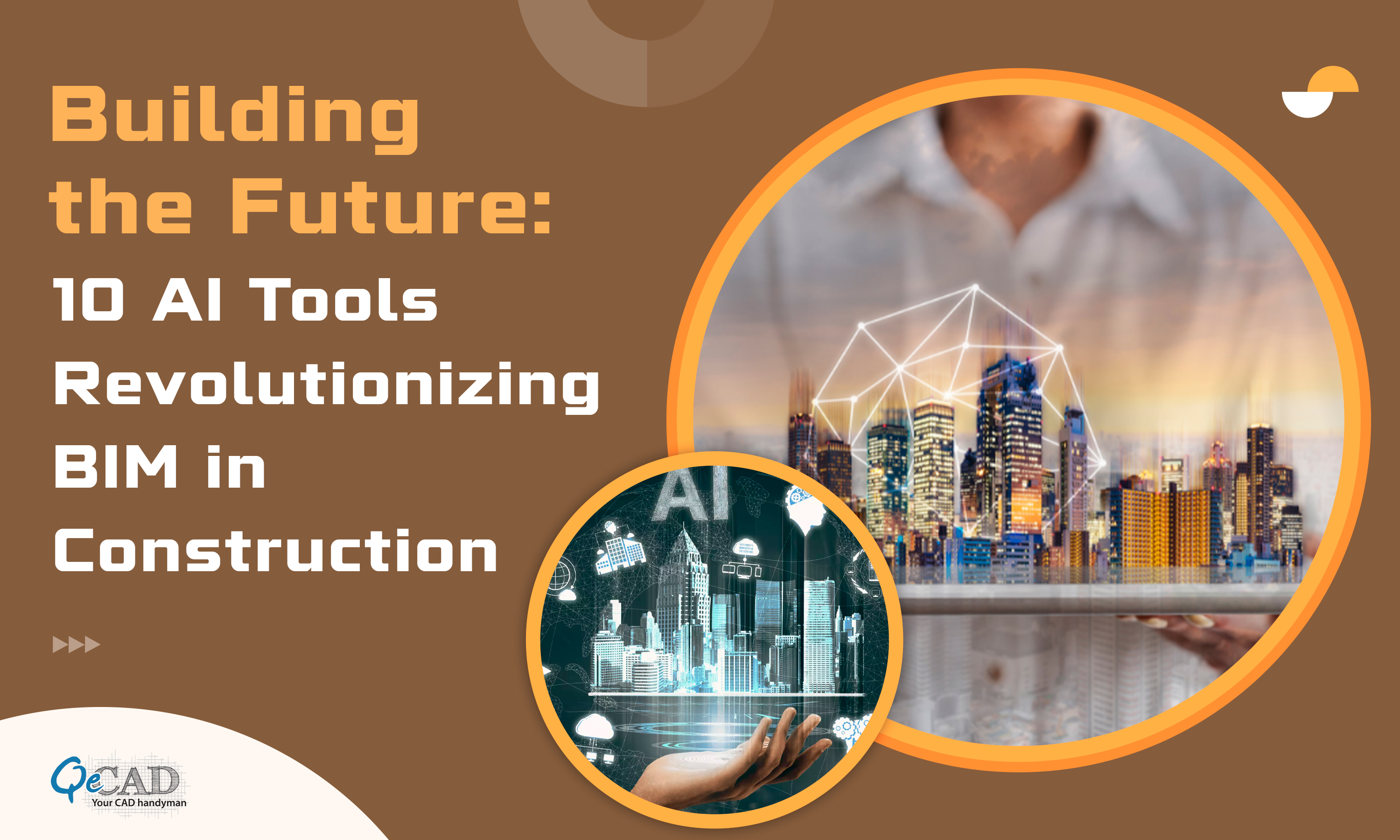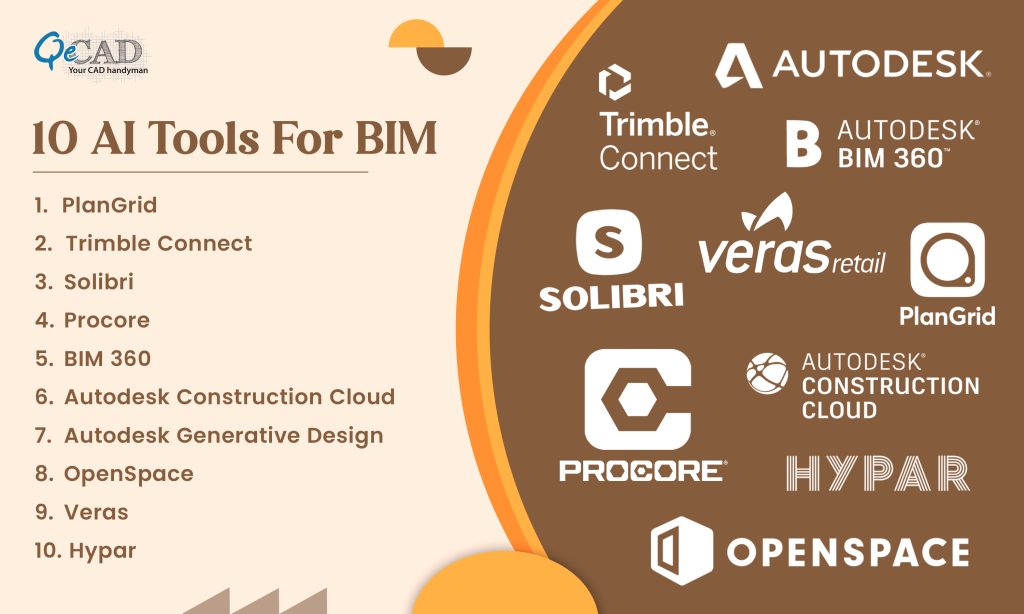
Introduction
Building Information Modeling (BIM) has transformed the construction sector through its collaborative and data-centric approach to both building design and management. With the advent of Artificial Intelligence (AI), BIM Services has seen even more significant advancements in terms of efficiency, accuracy, and project outcomes. In this blog, we will delve into the top 10 AI tools and technologies that are reshaping BIM in construction.
10 AI Innovations for BIM
1) PlanGrid:
PlanGrid, a part of Autodesk, is a construction productivity software incorporating AI to streamline construction document management. Its AI capabilities are particularly helpful in organizing and managing vast amounts of project drawings. Through machine learning, PlanGrid can automatically categorize and tag drawings, making it easier for project teams to access the proper documents quickly. It also offers automatic version control and sheet comparison features, reducing errors and preventing costly delays.
2) Trimble Connect:
Trimble Connect, an advanced BIM collaboration platform, integrates AI and machine learning to enhance collaboration and data management. AI-driven predictive analytics help project teams identify potential issues before they escalate, enabling more proactive decision-making. By harnessing the power of AI, Trimble Connect provides valuable insights into project performance, helping teams stay on track and within budget.
3) Solibri:
Solibri, another product within Trimble’s portfolio, utilizes AI for advanced model checking and quality assurance in BIM. Its intelligent algorithms compare BIM model elements to identify clashes and discrepancies accurately. Beyond clash detection, Solibri also validates compliance with building codes and standards, ensuring that designs meet regulatory requirements, which is crucial for project success.
4) Procore:
Procore, a comprehensive construction project management platform, leverages AI to optimize various aspects of construction processes. By incorporating predictive analytics, Procore assists project managers in anticipating potential delays or budget overruns. This AI-driven project insight enables better resource allocation and risk management, ultimately leading to more efficient and profitable projects.
5) BIM 360:
Autodesk’s BIM 360 is a robust platform integrating AI for project management and collaboration. AI automation streamlines document control, quality checks, and issue tracking, reducing administrative burdens and improving project efficiency. Real-time data analytics and reporting give project stakeholders the insights to make data-driven decisions, fostering better project control and outcomes.

6) Autodesk Construction Cloud:
Autodesk Construction Cloud is a comprehensive suite of construction management tools powered by AI and machine learning. It offers predictive risk analysis, allowing project teams to identify potential problems early and proactively mitigate risks. The platform automates workflows and provides real-time data analytics, further enhancing project performance and delivering projects on time and within budget.
7) Autodesk Generative Design:
Autodesk Generative Design takes advantage of AI to expedite the design process. Architects and engineers can input specific design parameters, and the AI generates thousands of design alternatives. This accelerates the design phase while optimizing structures for various criteria such as cost, sustainability, and aesthetics. Generative Design empowers designers to explore a broader range of possibilities, leading to innovative and efficient designs.
8) OpenSpace:
OpenSpace employs AI and 360-degree cameras to simplify site documentation and progress tracking. The platform’s computer vision technology automatically maps construction sites, providing an accurate digital representation of the project’s status. Project teams can monitor progress, identify issues, and streamline reporting using AI-generated site documentation, ultimately improving project transparency and efficiency.
9) Veras:
Veras utilizes AI to automate construction equipment management, an essential aspect of construction projects. AI-driven optimization algorithms help efficiently manage equipment usage, resource allocation, and maintenance schedules. Veras contributes to cost savings and project timeline adherence by reducing downtime and improving equipment utilization.
10) Hypar:
Hypar is an AI-driven platform that aids architects and engineers in generative Design and automation. By considering various factors such as local building codes, climate data, and material costs, Hypar assists in creating optimized designs. The platform empowers designers to explore design alternatives quickly, resulting in structures that are not only innovative but also functional and cost-effective.
Conclusion
Artificial Intelligence has evolved as a game-changer in the field of Building Information Modeling (BIM) within the construction industry. PlanGrid, Trimble Connect, Solibri, Procore, BIM 360, Autodesk Construction Cloud, Autodesk Generative Design, OpenSpace, Veras, and Hypar are prime examples of how AI is being integrated into BIM tools and technologies to enhance efficiency, reduce costs, and improve project outcomes.
These AI-powered tools automate various aspects of construction in many trusted BIM Company, from document management to equipment optimization and generative Design. They provide predictive insights, streamline workflows, and ensure building codes and standards compliance. As AI advances, these tools will play an increasingly vital role in reshaping the construction industry and enhancing construction projects’ efficiency, cost-effectiveness, and sustainability. Embracing these AI tools is not just a trend but a necessity for construction companies looking to stay competitive in today’s fast-evolving landscape.
